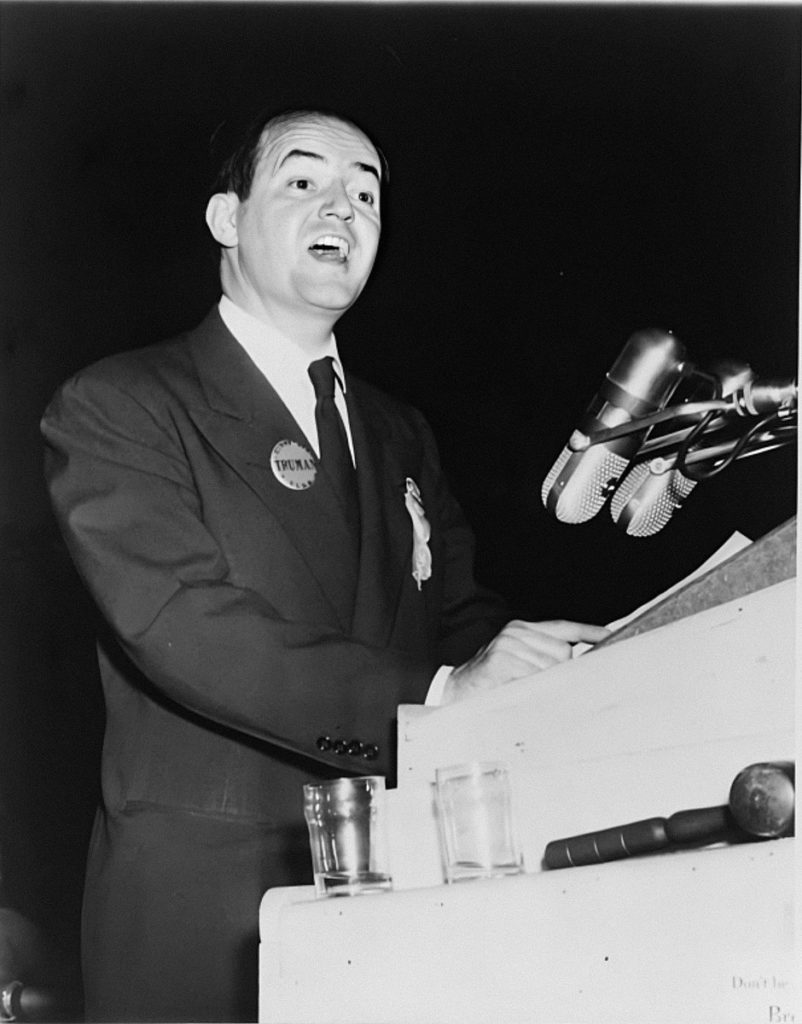
Hubert Humphrey, 1948 Democratic National Convention, AP photograph, Public domain, via Wikimedia Commons
He grew up in an all-white community in South Dakota. When he was 11 years old, he met his first person of another race. His father had developed his ability to appreciate everyone, and that meeting became a pivotal moment in his life.
Studying at LSU in the Jim Crow South further increased his sense of racial justice. When he pursued a Ph.D. at the University of Minnesota, he was befriended by Cecil Newman, a former Pullman car porter who founded a Black newspaper. Cecil became his mentor and shared with him the struggles African Americans had in unionizing the railroads.
After an initial unsuccessful run for office, he eventually won election to be mayor of Minneapolis. As mayor, he was in a position to frame the injustices of segregation as a human rights issue. When the Democratic Party held their convention in Philadelphia in 1948, he was invited to speak on the third day, not the best spot on the speaking roster.
The Democratic Party at the time was one of very divergent thinking about civil rights. The Southern Democrats held to the notion that states’ rights, including the right to organize society according to a racial hierarchy, should be retained in the party’s platform regarding civil rights. They were opposed by Democrats from the more liberal north who felt that a strong civil rights platform was necessary. President Truman, afraid of splitting the party, did not support the strong civil rights platform argued for by the Minneapolis mayor and northern Democrats.
When the mayor spoke he defied his President and many in his party when he said didn’t believe there could be “any compromise on the guarantees of the civil rights.” He went on to say,
My friends, to those who say that we are rushing this issue of civil rights, I say to them we are 172 years late. To those who say that this civil-rights program is an infringement on states’ rights, I say this: The time has arrived in America for the Democratic Party to get out of the shadow of states’ rights and to walk forthrightly into the bright sunshine of human rights. People — human beings — this is the issue of the 20th century. People of all kinds — all sorts of people — and these people are looking to America for leadership, and they’re looking to America for precept and example.
The next day, the Philadelphia Inquirer reported that the mayor got the “biggest hand of the stormy session.” The stronger civil rights platform was accepted and the Democratic Party was changed to one where equality and social justice became one of its most important values.
The mayor also apparently changed President Truman’s mind. Less than two weeks later, he issued an executive orders to desegregate the military and the federal work force.
Mayor Hubert Humphrey changed the Democratic Party by calling on it to do what was morally right. He later became vice president of the U.S. under Lyndon Johnson and ran unsuccessfully for president. Just imagine how such a call would be received today. In an era of mistrust, misinformation, and calls intended to invoke fear rather than to appeal to our better nature, we need more people in leadership positions opting for the moral choice.
On the 75th anniversary of that speech, isn’t it time to reflect on what has happened to our society? Who will provide us with the moral wakeup call that we need so badly? And how will we answer that call?
* * *
“The moral test of government is how that government treats those who are in the dawn of life, the children; those who are in the twilight of life, the elderly; and those who care in the shadows of life, the sick, the needy, and the handicapped.” – Hubert H. Humphrey
This is part of our “Just Imagine” series of occasional posts, inviting you to join us in imagining positive possibilities for a citizen-centered democracy.



